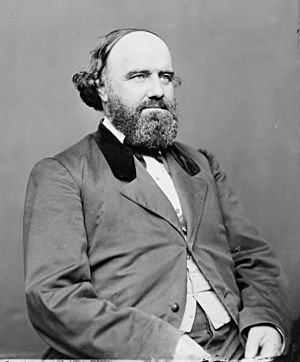Samuel C. Pomeroy facts for kids
Quick facts for kids
Samuel C. Pomeroy
|
|
|---|---|
 |
|
| United States Senator from Kansas |
|
| In office April 4, 1861 – March 3, 1873 |
|
| Preceded by | None (statehood) |
| Succeeded by | John J. Ingalls |
| Member of the Massachusetts House of Representatives |
|
| In office 1852–1853 |
|
| Personal details | |
| Born |
Samuel Clarke Pomeroy
January 3, 1816 Southampton, Massachusetts, U.S. |
| Died | August 27, 1891 (aged 75) Whitinsville, Massachusetts, U.S. |
| Political party | Republican |
| Spouses | Lucy Gaylord (m. April 23, 1846–1863 her death), Martha Stanwood Mann Whiting (m. September 20, 1866–1891) |
| Education | Amherst College |
| Profession | Politician, Teacher, Railroad President |
Samuel Clarke Pomeroy (January 3, 1816 – August 27, 1891) was an important United States senator from Kansas. He served in the United States Senate during the American Civil War. Pomeroy also worked in the Massachusetts House of Representatives. He was a member of the Republican Party. He also served as the mayor of Atchison, Kansas, from 1858 to 1859. Later, he became the second president of the Atchison, Topeka and Santa Fe Railroad. He was the first president to oversee the building and running of any part of the railroad.
Contents
Samuel C. Pomeroy's Life and Work
Early Life and Moving West
Samuel C. Pomeroy was born on January 3, 1816, in Southampton, Massachusetts. He went to Amherst College. Pomeroy did not agree with slavery. In 1854, he joined the New England Emigrant Aid Company. This group helped people move to Kansas. That same year, he led a group of settlers to Kansas. They helped start the city of Lawrence.
A Senator During the Civil War
On April 4, 1861, Kansas became a state. The Kansas legislature chose Pomeroy to be one of Kansas's first federal senators. He served alongside James Lane. This was during the American Civil War. In 1863, Senator Pomeroy helped Frederick Douglass meet with important leaders. He took Douglass to the War Department. There, Douglass met War Secretary Edwin Stanton. After that, Douglass also met with President Abraham Lincoln.
Helping Create Yellowstone National Park
In 1871, a group of scientists explored a wild area. This was the Hayden Geological Survey of 1871. They found amazing natural wonders. One of these scientists, Ferdinand Vandeveer Hayden, shared their discoveries. He told Senator Pomeroy about the area. On December 18, 1871, Pomeroy introduced a bill. This bill was called the Act of Dedication. It led to the creation of Yellowstone National Park. This was the first national park in the United States.
A Challenging Election
In 1873, Senator Pomeroy ran for reelection. He wanted to continue serving Kansas in the Senate. During this election, a state senator named Alexander M. York made a public statement. York claimed that Pomeroy had offered him money. This was said to be an attempt to get York's vote. Pomeroy strongly denied these claims. He said it was a plan to make him lose the election. He asked for a special committee to investigate.
The committee looked into the claims. They found that money was indeed exchanged. However, it was explained as money for a business deal, not a bribe. The committee decided there wasn't enough proof to say it was a bribe. They thought it might be a plan to defeat Pomeroy. Despite this, Pomeroy lost the election. John J. Ingalls became the new senator.
 | Delilah Pierce |
 | Gordon Parks |
 | Augusta Savage |
 | Charles Ethan Porter |

